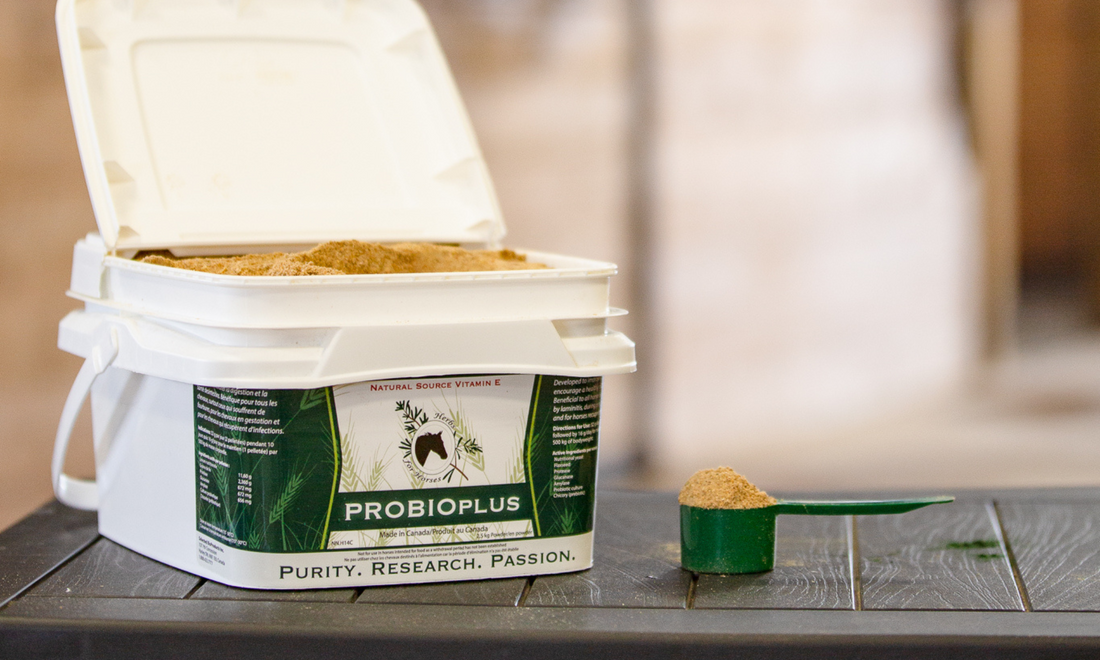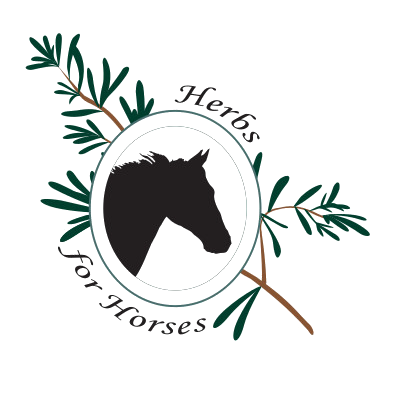
September 2024 Product Spotlight: ProbioPLUS®
ProbioPLUS® has been a staple in Canadian barns for more than 25 years. And now researchers at the University of Guelph are shedding light on why ProbioPLUS® is a product that no horse owner should be without.
Selected Bioproducts (Herbs for Horses) Inc. partnered with the University of Guelph to independently evaluate the effects of ProbioPLUS® on energy metabolism and microbiome health in horses. The first scientific manuscript resulting from these studies has been published in the prestigious Journal of Animal Science. In this study, researchers tested how the microbiome of the horse's cecum behaves when it is cultured with ProbioPLUS®.
The horse's cecum houses a highly complex ecosystem of bacteria, yeast, fungi, and protozoa which play critical roles in breakdown and fermentation of parts of the horse's diet that horses cannot digest on their own, including the complex fibers in hay. When the microbiome ferments these indigestible feed ingredients, they produce acetate, propionate, and butyrate, which are short-chain fatty acids (SCFAs) that the horse can absorb and use for energy. An optimally functioning microbiome can produce large amounts of these SCFAs, allowing horses to get more nutrition and energy from their diets, thereby contributing to healthy body condition, improved performance, and better gastrointestinal health.
But when the microbiome is disturbed, such as during high-intensity exercise, antibiotic use, or environmental stress, this can cause horses to become 'unthrifty', resulting in weight loss, poor performance, and potentially dangerous gastrointestinal problems. This research study demonstrates clearly that SCFA production by the equine cecal microbiota is significantly increased when it is cultured with ProbioPLUS®, providing new information on why this product has achieved such a loyal and widespread following.
Following the success of this series of experiments, researchers next wanted to find out what happens in the live horse when the microbiome is under stress. Can ProbioPLUS® help the horse's gastrointestinal tract adapt to that stress? To answer this question, a group of actively racing Standardbred horses was assigned to one of four groups:
- Group 1: ProbioPLUS® for 28 days
- Group 2: ProbioPLUS® for all 28 days plus oral antibiotics for the first 10 days
- Group 3: oral antibiotics for the first 10 days
- Group 4: no probiotics or antibiotics
This experiment was run four times, each time with different horses in different treatment groups, allowing each horse to serve as its own control. Researchers collected fecal samples periodically throughout the 28-day trials, and using a technique called '16s sequencing', they determined the relative bacterial composition of the horses' microbiome in each group. The microbiome of horses in Group 2 shifted towards greater representation of fiber degrading bacteria. The researchers concluded that the data provide support for the ability of ProbioPLUS to maintain a healthy gastrointestinal microbiome during antibiotic treatment. The manuscript for this study has recently been published in the journal 'Animals'.
We are so proud of the fact that ProbioPLUS® is the only equine probiotic in Canada supported with objective scientific research. But more importantly, we thank our customers for trusting us to support your horses' gut health for more than 25 years. We vow to do so for many more years to come.
The Geek Zone
- Probiotics - General
- Boucher L, Leduc L, Leclère M, Costa MC. Current Understanding of Equine Gut Dysbiosis and Microbiota Manipulation Techniques: Comparison with Current Knowledge in Other Species. Animals (Basel). 2024 Feb 28;14(5):758. doi: 10.3390/ani14050758. PMID: 3847
- Synbiotics - Improved Gut Health
- Lagounova M, MacNicol JL, Weese JS, Pearson W. The Effect of Dietary Synbiotics in Actively Racing Standardbred Horses Receiving Trimethoprim/Sulfadiazine. Animals (Basel). 2023 Jul 18;13(14):2344. doi: 10.3390/ani13142344. PMID: 37508120; PMCID: PMC10376
- MacNicol JL, Renwick S, Ganobis CM, Allen-Vercoe E, Weese JS, Pearson W. The influence of a probiotic/prebiotic supplement on microbial and metabolic parameters of equine cecal fluid or fecal slurry in vitro. J Anim Sci. 2023 Jan 3;101:skad034. doi: 10.10
- Probiotics - Improved Exercise Performance
- Laghi L, Zhu C, Campagna G, Rossi G, Bazzano M, Laus F. Probiotic supplementation in trained trotter horses: effect on blood clinical pathology data and urine metabolomic assessed in field. J Appl Physiol (1985). 2018 Aug 1;125(2):654-660. doi: 10.1152/ja
- Probiotics - Wound Healing and Inflammation
- Wilmink JM, Ladefoged S, Jongbloets A, Vernooij JCM. The evaluation of the effect of probiotics on the healing of equine distal limb wounds. PLoS One. 2020 Jul 29;15(7):e0236761. doi: 10.1371/journal.pone.0236761. PMID: 32726347; PMCID: PMC7390451.
- Martinez RE, Leatherwood JL, Arnold CE, Glass KG, Walter KW, Valigura HC, Norton SA, White-Springer SH. Responses to an intra-articular lipopolysaccharide challenge following dietary supplementation of Saccharomyces cerevisiae fermentation product in young horses. J Anim Sci. 2021 Oct 1;99(10):skab272. doi: 10.1093/jas/skab272. PMID: 34619765; PMCID: PMC8557629.
